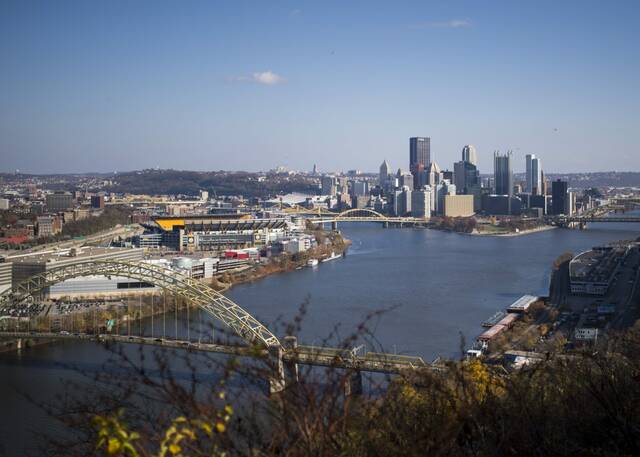It took Pittsburgh council less than three months to effectively spend all but $30 million of the $167.5 million it received in federal American Rescue Plan Act funds this year, Councilwoman Deb Gross told her colleagues Tuesday.
The city should have slowed the process and held off on transferring the money to programs administered by outside agencies, Gross said.
But council members approved $95 million in transfers. They will pay for a program to test the viability of guaranteed basic income administered by the nonprofit OnePGH, lead water line replacement projects for Pittsburgh Water and Sewer Authority and a bevy of development programs run by the Urban Redevelopment Authority.
The allocations were a part of the four-year plan drafted by Mayor Bill Peduto’s office and city council members to spend the $335 million Pittsburgh will receive under the law, which was signed in March by President Joe Biden to fund a wide range of relief programs to help the nation weather the coronavirus pandemic.
Gross said the allocations effectively spend more than 55% of the $167.5 million the city received this year under the law. Another $40 million was already approved for use to balance this year’s budget and fund other capital projects.
The American Rescue Plan Act money is distributed to cities in two installments, one received in July and another set to be distributed in July 2022. In Pittsburgh’s case they’re deposited into a trust fund until spent.
By taking the actions they did on Tuesday, however, the city has depleted all but about $30 million of the fund, Gross said.
“We are sending checks to outside authorities to hold the funds for no reason,” Gross said.
Residents and some community groups had asked council for a longer process that included more public input about how to allocate the money.
Council held several public hearings after Peduto introduced the plan June 28 and held more community meetings in August about it.
Each of the funding measures in the plan also requires council approval. On Tuesday council approved:
• $2.5 million to the nonprofit OnePGH for a two-year program that will provide $500 monthly payments to 200 low-income residents, including 100 Black women.
The program is part of a national experiment in more than a dozen cities to determine if providing guaranteed basic income can improve the lives of low-income people.
• $74.8 million to the Urban Redevelopment Authority for a variety of projects, including its Avenues of Hope program that aims to revitalize business corridors in the city’s Black neighborhoods; the OwnPGH program that helps people who otherwise couldn’t buy homes to do so; and the city’s Land Bank, which is now being administered by the URA; and several other URA programs.
• $17.5 million to Pittsburgh Water and Sewer Authority for its lead line replacement program.
Council added amendments to the legislation requiring the programs to be audited and monitored by Controller Michael Lamb and requiring URA, OnePGH and PWSA to submit quarterly reports to the city about how the money is being spent.
“It’s a good start,” Gross said of the amendments.
Gross was the lone “no” vote on each of the allocations. Councilman Anthony Coghill opposed the guaranteed basic income program allocation.








